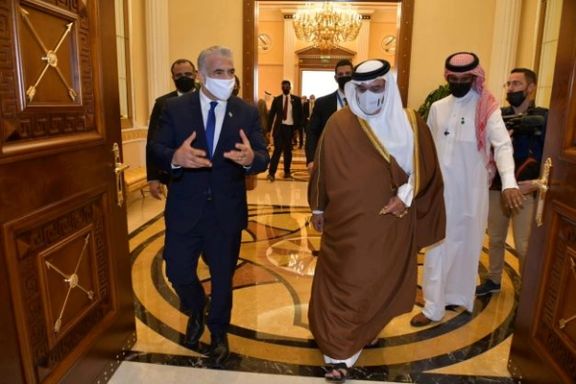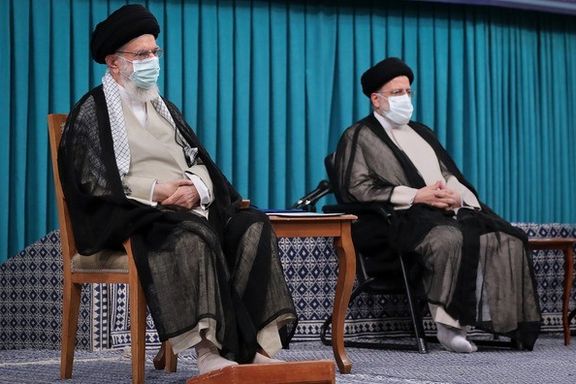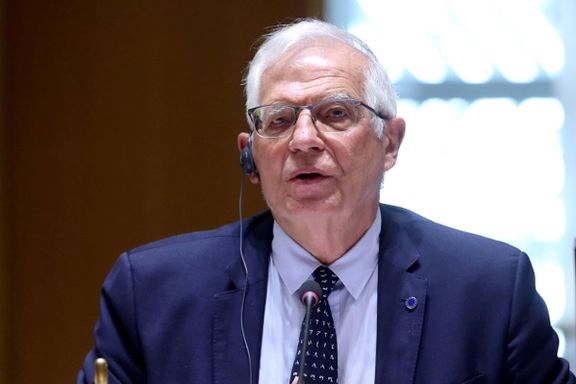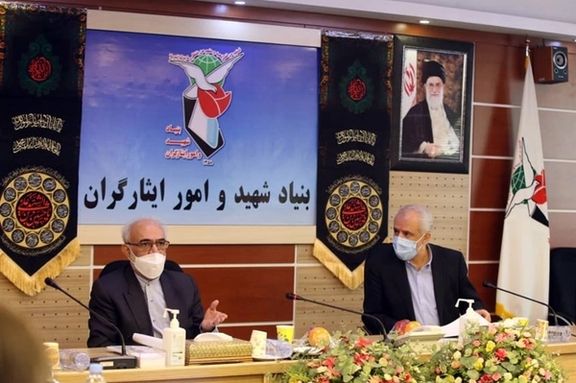Israeli FM Thanks Bahrain King For 'Warm, Hopeful' Meeting

Israel's foreign minister thanked Bahrain's King Hamad bin Isa Al Khalifa for a "warm and hopeful meeting" on Thursday as part of a landmark trip to the small Gulf state.

Israel's foreign minister thanked Bahrain's King Hamad bin Isa Al Khalifa for a "warm and hopeful meeting" on Thursday as part of a landmark trip to the small Gulf state.
Yair Lapid's arrival was the first high-level visit to the country by a senior Israeli official since the signing last year of an agreement to establish diplomatic ties.
"The king's leadership and inspiration led to genuine cooperation and the meeting paved the way for the continuation of the relationship," Lapid said a statement released by the Israeli Foreign Ministry.
Lapid had earlier landed in Bahrain's capital, Manama, for meetings with his Bahraini counterpart and to inaugurate Israel's embassy.
Israel established formal diplomatic relations with four Arab states last year as part of the U.S.-brokered "Abraham Accords."
Lapid has already visited the United Arab Emirates and Morocco and opened Israel's diplomatic offices there since he became Israel's foreign minister in June.
Bahrain's first ambassador to Israel arrived earlier this month and presented his credentials to Israel's figurehead president on the anniversary of the signing of the accords.
The two countries had long enjoyed clandestine security ties over a shared distrust of regional rival Iran, but only last year took the relationship public.
Report by AP

After a letter from Iran's Supreme Leader Ali Khamenei, President Ebrahim Raisi has insisted Iran will not take imports from South Korea’s LG and Samsung.
This follows speculation for some months that a reported agreement over using Iranian money frozen in Korean banks to buy humanitarian goods might be extended to cover Korean-made home appliances, which dropped out of the Iranian market when the United States introduced stringent banking sanctions in 2018.
The letter, signed by Khamenei office chief Mohammad Mohammadi Golpaygani September 6, cited a call from Iranian manufacturers that Korean home appliances be kept out.
Khamenei's ban could also be a means to pressure South Korea to address the issue of Iran's frozen funds. On Thursday, two days after the ban was made public, Iran's foreign minister Hossein Amir-Abdollahian held a phone talk with his Korean counterpart Chung Eui-yong and urged him to redouble efforts to address the issue.
Raisi conveyed the leader’s office instruction to the relevant ministers − for the economy, and for industries, mines and trade − September 8. Official news agencies Tuesday published the two communications.
The value of Iran's home appliances market has been estimated at between 4.5 to 6 billion dollars. Aside from problems with US sanctions, Iran has for several years not issued import permits for home-appliances if comparable items are made at home.
Khamenei's letter referred only to "two South Korean companies" but meant LG and Samsung, who ceased trade with Iran after the US introduced in 2018 financial sanctions threatening third parties in 2018, despite Iran’s warning it would be difficult for them to return once US sanctions ended. The Korean firms had previously established an important market, including the assembly in Iran by Iranian companies of a variety of goods including air conditioners, and TV and audio sets.
In February media reported the US Treasury was in talks with South Korea to allow the transfer of some of Iran's funds frozen by Korean banks to Switzerland for humanitarian purchases. In July the South Korean Finance Ministry said an agreement had been reached.
Some Iranian media claimed the agreement also allowed frozen funds to be used to buy products from LG and Samsung to send to Iran. This was denied by an official of Iran's Home Appliances Industries Association, Abbas Hashemi, on September 6 in an interview with the Iranian Students News Agency (ISNA), when he insisted Tehran rather than Washington should decide how to use the frozen money.
"The matter is not too complicated,” Mohammad-Reza Bagheri, a hardliner activist tweeted Thursday. “South Korea wanted to pay its debt with home appliances, conquer our markets and paralyze our industries…the Supreme Leader has opposed it."
Others on social media took a different view, posting in support of importing Korean products by claiming they were better than others on the market, or that not importing South Korean products benefits Chinese companies. Goldiran and Sam Service, the two Iranian companies that assembled LG and Samsung products for over two decades, now work with Chinese producers.
"Khamenei's ban on South Korean home appliances is more backing Chinese than Iranian domestic production because currently [Iranian companies] only assemble Chinese parts in Iran. Nothing is being produced," one of the many tweets against the ban said.

After a letter from Iran's Supreme Leader Ali Khamenei, President Ebrahim Raisi has insisted Iran will not take imports from South Korea’s LG and Samsung.
This follows speculation for some months that a reported agreement over using Iranian money frozen in Korean banks to buy humanitarian goods might be extended to cover Korean-made home appliances, which dropped out of the Iranian market when the United States introduced stringent banking sanctions in 2018.
The letter, signed by Khamenei office chief Mohammad Mohammadi Golpaygani September 6, cited a call from Iranian manufacturers that Korean home appliances be kept out.
Khamenei's ban could also be a means to pressure South Korea to address the issue of Iran's frozen funds. On Thursday, two days after the ban was made public, Iran's foreign minister Hossein Amir-Abdollahian held a phone talk with his Korean counterpart Chung Eui-yong and urged him to redouble efforts to address the issue.
Raisi conveyed the leader’s office instruction to the relevant ministers − for the economy, and for industries, mines and trade − September 8. Official news agencies Tuesday published the two communications.
The value of Iran's home appliances market has been estimated at between 4.5 to 6 billion dollars. Aside from problems with US sanctions, Iran has for several years not issued import permits for home-appliances if comparable items are made at home.
Khamenei's letter referred only to "two South Korean companies" but meant LG and Samsung, who ceased trade with Iran after the US introduced in 2018 financial sanctions threatening third parties in 2018, despite Iran’s warning it would be difficult for them to return once US sanctions ended. The Korean firms had previously established an important market, including the assembly in Iran by Iranian companies of a variety of goods including air conditioners, and TV and audio sets.
In February media reported the US Treasury was in talks with South Korea to allow the transfer of some of Iran's funds frozen by Korean banks to Switzerland for humanitarian purchases. In July the South Korean Finance Ministry said an agreement had been reached.
Some Iranian media claimed the agreement also allowed frozen funds to be used to buy products from LG and Samsung to send to Iran. This was denied by an official of Iran's Home Appliances Industries Association, Abbas Hashemi, on September 6 in an interview with the Iranian Students News Agency (ISNA), when he insisted Tehran rather than Washington should decide how to use the frozen money.
"The matter is not too complicated,” Mohammad-Reza Bagheri, a hardliner activist tweeted Thursday. “South Korea wanted to pay its debt with home appliances, conquer our markets and paralyze our industries…the Supreme Leader has opposed it."
Others on social media took a different view, posting in support of importing Korean products by claiming they were better than others on the market, or that not importing South Korean products benefits Chinese companies. Goldiran and Sam Service, the two Iranian companies that assembled LG and Samsung products for over two decades, now work with Chinese producers.
"Khamenei's ban on South Korean home appliances is more backing Chinese than Iranian domestic production because currently [Iranian companies] only assemble Chinese parts in Iran. Nothing is being produced," one of the many tweets against the ban said.

Stalled talks between Iran and world powers to reinstate a 2015 nuclear deal will resume "soon", the European Union's foreign policy chief Josep Borrell said on Thursday.
Speaking at a news conference in the Qatari capital Doha, Borrell was referring to indirect talks between Tehran and Washington in Vienna that began in April and were suspended by Iran two days after hardline cleric Ebhraim Raisi (Raeesi) won Iran’s presidential election in June. Iran first said it needed time to form a government but more than a month has passed since a cabinet was formed. Tehran now says it is evaluating the previous rounds of negotiations.
Borrell said he believed the negotiations aimed at bringing back Tehran and Washington into full compliance with the agreement will resume "within an acceptable period of time".
After former US President Donald Trump ditched the deal three years ago and reimposed sanctions on Iran, Tehran has been rebuilding stockpiles of enriched uranium, enriching it to higher levels of fissile purity and installing advanced centrifuges to speed up production.
President Joe Biden aims to restore the deal, but the sides disagree on which steps need to be taken and when, with the key issues being what nuclear limits Tehran will accept and what sanctions Washington will remove.
Western powers have urged Iran to return to negotiations and said time is running out as Tehran's nuclear program is advancing well beyond the limits set by the deal.
Tehran says its nuclear steps are reversible if Washington lifts all sanctions. Iranian and Western officials have said many issues remain to be resolved before the accord can be revived.
Echoing Iran's official stance, Iran's foreign ministry spokesman told Le Monde newspaper that "Iran has reached conclusion that we certainly will return to the nuclear talks" in Vienna.
Saeed Khatibzadeh added that Iran would not "waste an hour before returning to Vienna talks once a re-evaluation of the sixth round of the nuclear talks" is completed by Raisi's government.
Despite Iran's need to bolster its economy by negotiating an end to US sanctions, insiders expect Raisi to adopt a tougher line when the talks resume.
France said it is counting on China, which has close ties to Tehran, to use its most "convincing arguments" with Iran to get Tehran back to nuclear talks, French Foreign Ministry spokeswoman Anne Claire Legendre said in a response to a Reuters question.
European officials say they are determined to keep unity among the parties to the nuclear deal - China, France, Russia, Britain, Germany and the United States - but have become increasingly concerned about China’s role.
US and European officials have said that the United States has reached out to China about reducing its purchases of Iranian crude oil.
Report by Reuters

Amir Hossein Ghazizadeh Hashemi is settling into a new job as chief of the Foundation of Martyrs and Veterans Affairs, a behemoth linked to the Revolutionary Guards (IRGC).
Hashemi was appointed earlier this month by President Ebrahim Raisi (Raeesi), putting him for the first time in charge of a financial powerhouse, with millions under its care. Raisi has also handed him a potential political base with a chance to develop closer ties across the military, including the IRGC’s extraterritorial, dark-arts Quds (Qods) Force.
Before serving as the head of the martyrs foundation, Ghazizadeh was the deputy speaker of the Majles, the Islamic Republic’s parliament. He is a former member of the Paidary Front, an ultra-hardline political organization founded by disciples and supporters of Mohammad Taghi Mesbah Yazdi, a militant cleric even by the Islamic Republic’s standards. Ghazizadeh also ran in Iran’s 2021 presidential elections and came in fourth. He comes from a prominent insider family: a brother and a cousin serve in the Majles and another cousin is a former health minister.

In 1980 then-Supreme Leader Ruhollah Khomeini established the foundation to aid the families of those who had fallen in the revolution. As the Iran-Iraq war began, the foundation added the families of war dead to its portfolio. In 2004 providing service to veterans was added to its responsibilities. Like many other institutions in the Islamic Republic, the foundation’s leadership consists of two primary officials: the supreme leader’s representative and the head of the foundation. Iran’s president appoints the head in consultation with the supreme leader, effectively intertwining the two roles.
Since martyrdom is the cornerstone of Shiism, martyrs, veterans, and their families are of immense political importance. The foundation has been the vehicle for keeping the families of martyrs aligned politically: it rewards regime-supporters with financial benefits and employment and education opportunities. The refractory lose these benefits and more.
While Iran’s national budget provides it with funding, the foundation also has a vast business empire and operates abroad. It thus has prodigious financial resources to advance its agenda. One of the key business entities it controls is Kowsar Economic Organization, which owns 43 firms, some of which are holdings or investing companies, with extensive interests in a wide range of industries. The Shahed Investment Company is another major economic arm of the organization that is publicly traded and heavily involved in the real estate and construction sectors. The foundation also owns Dey Bank, which the United States sanctioned in 2018. These three entities closely work together and have intertwined ownershipstructures and operations.

The foundation extends services to martyrs and veterans from other countries, too. Last year, the foundation’s chief announced that it covers members of the Fatemiyoun brigades, the Shiite Afghan brigade of the Quds Force, which has been fighting alongside the IRGC in Syria. The Lebanese Hezbollah has its own martyrs foundation, founded in 1982, which is, according to the U.S. Treasury, a branch of Iran’s martyrs foundation. The Iranian foundation and its officials regularly meet with representatives of Hezbollah and provide technical and financial support. Similarly, in Yemen, the Iranian foundation has created a branch to help the Shiite Houthis, according to some reports.
The Iranian organization also supports families of Palestinian terrorists through the Palestinian Martyrs Foundation, founded in 1993 as a branch of the Lebanese foundation. The Iranian mothership’s relations with its foreign proxies are quite similar to the Quds Force’s relationship with its foreign proxies — that is, the foundation provides financial, training, and technical support to loyal local elements, who then run the day-to-day operations of the affiliated organizations.
The United States first sanctioned the Iranian foundation and its Lebanese branch in 2007. Over the years, this organization and its front companies managed to raise funds in the United States and transfer it to Hezbollah. In 2020 Treasury designated a network of firms and individuals related to the Lebanese foundation. However, Washington has not sanctioned the Iranian Martyrs Foundation’s business network even though Tehran uses it to finance terrorism by guaranteeing lifelong financial support for jihadists, terrorists, and their families.
That omission warrants correction: Washington should sanction Ghazizadeh and the rest of the foundation’s leadership. The Kowsar Economic Organization, Shahed Company, and their subsidiaries and controlled firms should also not escape punishment.
Saeed Ghasseminejad is a senior advisor on Iran and financial economics at the Foundation for Defense of Democracies (FDD). Follow Saeed on Twitter @SGhasseminejad. FDD is a Washington, DC-based, non-partisan research institute focusing on national security and foreign policy.
The opinions expressed by the author are not necessarily the views of Iran International

As tensions between Tehran and Baku were visible in recent days, Iranian officials and government-controlled media try to portray the situation as normal, with politicians take occasional shots at the Republic of Azerbaijan.
However, Iranian military deployments to its northern border near Armenia and Azerbaijan, and statements on Iranian social media tell a different story.
As Iran's roads authority said transit routes to Armenia via the Republic of Azerbaijan are open, the Iranian armed forces have announced a major military exercise at the country's north-western borders with the Republic of Azerbaijan.
Tensions rose between Iran and Azerbaijan in recent weeks following Azerbaijan's arrest of Iranian truck drivers and its joint military drills with Turkey and Pakistan, which began September 12 in Baku, about 500km from the Iranian border.
While Iran's ambassador to Baku has been going around in the Azeri capital meeting with his European counterparts explaining Iran's position about the differences between the Republics of Azerbaijan and Armenia, according to the Iranian official news agency IRNA, Tehran's plenipotentiary ambassador to Yerevan on Wednesday met with Armenia's Deputy Prime Minister Suren Papikyan.
Iranians on social media have been reporting that the Islamic Republic of Iran and the Republic of Azerbaijan might be at the brink of a war although apparently all is well in Iran's northwestern front as far as Iranian newspapers and news agencies are concerned.
An IRGC Twitter account, @Sepah_FA, reported on September 29 that: "The Islamic Republic will not tolerate any geopolitical changes at its borders and will strongly resist against the enemies' hostile objectives." The IRGC account continued: "While warning those who wish to destabilize Iran'snorthern borders, we express our readiness to avert the enemies' plots."
Meanwhile, several Twitter accounts posted videos and photos of Large Iranian military convoys proceeding toward the borders. Sharq daily analyst Salar Seyf wrote on Twitter: "We are witnessing the biggest Iranian military expedition since the Iran-Iraq war of the 1980s. If the enemy wishes to attack and occupy an Armenian province, Iran will step forward to foil the plot."
Iranian Twitter user Hossein Mahmooudi Asl whose account is followed by some of Iran's most prominent journalist wrote: "Wait for a crackdown on Pan-Turk networks and infiltrators in Iran and Turkey's espionage network in this country."
The social media account Azariha, as well as several other channels posted a video of an Iranian military convoy and wrote: "This is a massive deployment of Iranian military equipment to the borders with the northern dictatorship just in case it makes the slightest mistake."
Hossein Dalirian, a military analyst and a former editor of IRGC-linked news agency Tasnim, wrote in Twitter post: "Just imagine that a war breaks out with the Republic of Azerbaijan. The Islamic Republic can fire 1,000 ballistic missiles and hit 1,000 key points. The war will end in one day. And there will be no time to use other equipment. Do not pay attention to bragging [by Azeri officials]."
Dalirian was referring to speeches by Azeri MPS who said Iran should be wiped off the map. Other social media users also said that Azeri leader Ilham Aliyev has spoken against Iran recently using strong words.
Meanwhile, Hamed Heidarpoor Kiasara, an Iranian Twitter users, posted pictures of Azeri military vehicles and wrote that simultaneous with the Iranian military build-up at the Azeri borders, the Republic of Azerbaijan also deployed military equipment to Iran's borders.
Another Iranian on social media asked what will the pro-Hezbollah Azeri Hussainiyoun militias' position be in a possible conflict between Tehran and Baku.
During the war between Armenia and Azerbaijan in 2020, Iran accused Turkey and Azerbaijan of deploying Syrian jihadist groups at the border with Iran to destabilize the region. During the past months, Iran on several occasions complained that Azerbaijan has closed the transit route to Armenia.
Although during the latest conflict in the Karabakh region Iran expressed support for Azerbaijan under pressure from its own local ethnic Azeries, Tehran has traditionally backed Yerevan against Baku since the 1990s.